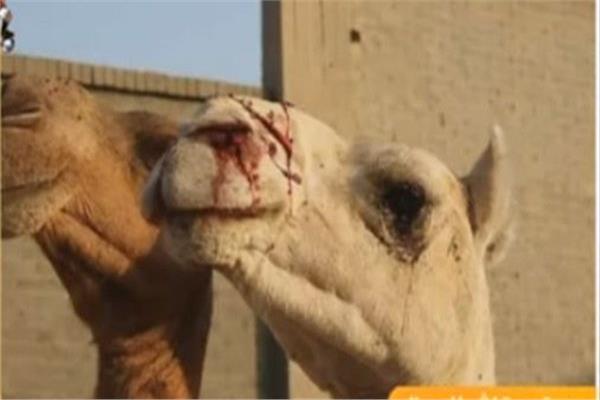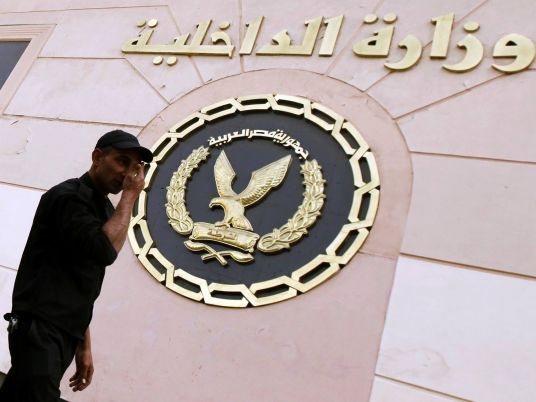
Two Cairo University veterinary students-turned-whistleblowers have made allegations of animal cruelty at the Faculty of Veterinary Medicine. It is the first time animal welfare activists have had hard evidence on which to pin their longstanding claims that the faculty mistreats the animals it uses for experiments and student training.
The students have posted a video on YouTube, filmed in March 2012, of stray dogs being unloaded from a pick-up truck on the faculty grounds. In the video, a man in a blue galebeya cursorily hauls a dog by its hindlegs and kneels on the ribcage of another, while the condemned animals snarl, yelp and whimper. The dogs are clearly highly distressed and students laugh in the background.
According to the prominent animal welfare activist Dina Zulfikar, the two students, who have asked to remain anonymous, have also seen live dogs thrown from a third floor faculty window.
The faculty is now facing an energized animal rights campaign.
The faculty dean has apologized and the university has formed a committee to investigate the videoed incident. It has also promised to publish the investigation and punish the wrongdoers.
Up to 30 animal welfare activists, loosely affiliated with the animal protection charity SPARE, say they are not satisfied and have vowed to prosecute the faculty under Article 357 of the Penal Code, which carries a 6 month jail term and a LE200 fine.
A group will also protest outside of the faculty on Saturday, 5 May to demand immunity for the student whistleblowers, the immediate results of the investigation, the adoption of alternatives to animal experimentation, and for the faculty to lobby the Egyptian government to ease import restrictions on the animal euthanasia drug Pentobarbitone-5.
The University’s Faculty of Veterinary Medicine is regarded as the premier veterinary school in Egypt.
“This wasn’t kids on the street,” says SPARE founder and president, Amina Tharwat Abaza. “It happened under the eyes of the professors, the students, the teachers. These people are the basis of every animal abuse. They will graduate and go to work in the slaughterhouses, in the zoos, in the veterinary clinics,” she added.
The chain of events began with a Facebook message, at 9:24 pm on Friday, 27 April. A student of the Veterinary Faculty wrote on the Facebook group “Animal Rights Watch in Egypt” that animal rights are violated in the faculty, Zulfikar says.
“I asked him for explanation, proof, and evidence. He said groups of dogs are taken for research and experiments, and after being done with, the dogs are thrown from the 3rd floor, then tied, then grabbed. I asked for evidence. He said he had a video and some of the veterinary students, his colleagues, can testify. He then sent me the video,” Zulfikar explains.
Zulfikar says that students and as well as workers in the nearby coffee shop are willing to testify to having seen live dogs thrown from the third floor window. She says the students contacted the Animal Rights Watch in Egypt Facebook page after an attempt to file a complaint against the doctor in charge failed.
Abaza says the prosecution’s case has dozens of witnesses.
After one of the students sent Zulfikar the video, she shared the YouTube link on the Facebook page. Events started to move quickly. Zulfikar phoned Dr. Shehab Osman, chairman of the Egyptian Federation of Animal Welfare. She forwarded him the video link.
“I immediately called the dean and he said he didn’t know anything about the video,” Dr. Osman told Egypt Independent. The next day, 29 April, the doctor posted on the Animal Rights Facebook page that the dean had apologized and ordered an investigation.
Two days later, an online petition of protest clocked 2,000 signatures in its first 24 hours. Abaza says she has received many emails from overseas animal rights activists. Overseas activists have been so fervent in their support, she says, they have been listing their passport numbers.
Meanwhile, Dr. Osman was interviewing the two culprits in the video. He says that one is a man who rounds up stray dogs from the street and sells them to the faculty. The second is an employee of the faculty, though not a professor.
The faculty employee is talking to his lawyer, and has been encouraged to post an account of his actions on the Facebook page, the doctor says. “He will tell me today or tomorrow what he is doing,” he says.
Dr. Osman’s next step is to arrange an animal treatment seminar for faculty professors. “We want to arrange that as soon as possible. I want one of the animal rights activists to do this lecture.”
But it will take more than the power of social media and a seminar for reconciliation between the faculty’s employees and the animal lovers outside the gates. The activists fear the mistreatment of animals at the country’s main veterinary school has propagated mistreatment through Egypt. They also believe the faculty’s problems are systemic and ingrained.
Egypt has become one of the world’s largest markets for the banned trade in wild and endangered animals. Pet shops selling “exotic” animals, such as chimpanzees and lion cubs, are proliferating. In September 2001, untrained customs officials at Cairo airport opened a suitcase containing a young chimpanzee and a baby gorilla. They drowned them in a vat of chemicals.
Since 2008, Abaza has been the Egyptian Ambassador for World Animal Day, a London-based NGO. “Once you start to talk about animal welfare in Egypt, people think you’re crazy,” she says.
“They think if you are violent to an animal you won’t be violent to people.”
Abaza says she has witnessed donkeys starving inside the faculty grounds and mixed packs of male and female dogs kept in the same cages. When she asked to film inside the experimentation rooms for a news segment celebrating World Animal Day in 2010, she was refused access. The conditions of many dogs being kept inside under artificial light were “nightmarish,” she says.
But far worse, she says, was the callous attitude of students and professors alike. “The young students were coming and going hearing the screams of the dogs, and doing nothing.”
She alleges dogs are being experimented on without anesthetic and euthanized with electric shocks. The international standard drug for humane euthanasia, Pentobarbitone 5, is banned in Egypt. The preservative formaldehyde is used as an alternative, Abaza says.
Dr. Mohamed Nabawy, who graduated from the faculty five years ago and works at SPARE, said that while he was a student it was common practice for 40 students to train on one donkey. When students practiced injections, each would inject their syringe in the same spot of the animal’s neck. The neck swelled with a hematoma.
“We wanted to take a positive approach, but they’re not listening,” says activist Ahmed Diab, who supports the movement to prosecute.
“We have been trying to work with them. The standard excuse is they don’t have the resources to meet our requests. But it takes no extra resources to handle an animal humanely. We don’t want our vets to turn into animal abusers,” he concluded.




